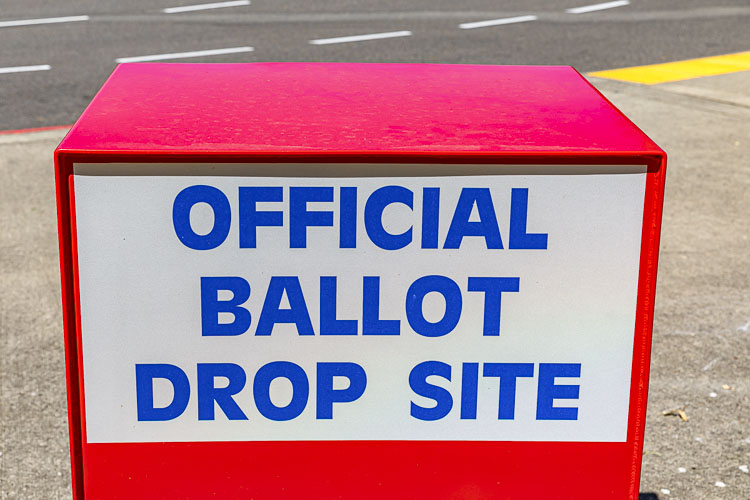
‘It could point to a need to educate election officials regarding the requirements under the law’
Bob Unruh
WND News Center
A new report has revealed that in defiance of routine elections record-keeping strategies, and federal law, more than 90% of the key counties across the nation failed to keep their 2020 elections records.
“The America First Policy Institute made public records requests based on state-specific laws for the top 100 most-populated counties in the traditional 14 swing states that typically determine presidential elections. Ninety-four of the 100 counties did not keep records of who voted in the 2020 election, and only two state-wide election officers had the records preserved. Equally disturbing, even in the six counties that did keep records, there was on average a 2.89 percent discrepancy between the number of people voting and the number of ballots cast,” said the report from John R. Lott, Jr., of the Crime Prevention Research Center, and Steve Smith, of the America First Policy Institute.
It appeared in The Federalist.
“Unfortunately, election officials across the country are not keeping the most basic data to monitor election outcomes. Even when they say they do, the numbers do not come close to matching up,” they explained. “It was a simple goal: match the number of voters with the number of ballots cast. After the last general election there were concerns that ballots were counted multiple times (so that there could be more ballots cast than voters who voted) and that ballots were destroyed (so that there could be more voters who voted than ballots cast). But, through our examination, we learned that it cannot be determined if these discrepancies exist, because most states and counties simply do not keep timestamped records of who voted as required by law.”
They noted, “In Miami-Dade, Florida, the discrepancy was about 1.6 percent — a difference of 16,617 votes. Ninety-two percent of the precincts had more recorded ballots cast than voters (for a total of 15,854), and the other 8 percent had more voters than ballots cast (763). Since 12 percent of precincts were missing records, we didn’t include those. That’s a discrepancy that can very well swing elections. For example, in 2018, Republican Rick Scott won Florida’s U.S. Senate seat by 10,033 votes.”
Further, the report confirmed, “Cobb County, Georgia, had a massive discrepancy of 34,893 votes, or 8.8 percent. All but one of the precincts had more ballots cast than voters. The gap was more than two and half times the 13,471 votes Republican David Perdue fell short of winning in Georgia’s first round Senate race in November 2020. Sen. Jon Ossoff then won the run-off the following January.”
The report notes the Federal Civil Rights Act of 1960 requires that “all records and papers… relating to any… act requisite to voting in such election [for federal office] be kept for 22 months.”
Some county elections officials simply wrote over the original computer file.
“This could be sloppiness, or it could point to a need to educate election officials regarding the requirements under the law. What we know is that data storage is trivially inexpensive, and it would be easy to save a file time stamped on election day.”
Singled out for special criticism was Montana, where the election is all mail-in.
“A January 4, 2021, recount of the 2020 election found 4,592 fewer envelopes than the County Election Office’s tally of 72,491 votes. That is a 6.33 percent difference in votes counted. A second March 28, 2022, recount found only 71 fewer envelopes than votes. During that recount, two more boxes of envelopes were discovered. Questions were raised about whether the two missing boxes were accidentally mislaid or fraud was committed,” the report said.
While a video of election night should answer the question of how many envelopes were opened, Missoula County erased its video.
The report said, “Something needs to be done. Fifty percent of likely U.S. voters think it is likely that ‘widespread cheating will affect the outcome of this fall’s congressional elections,’ including 35 percent of Democrats and 70 percent of Republicans.”
Following the law would help, the report concludes.
“Any discrepancy could quickly and easily be addressed or investigated,” the report said.
Also read:
- Court rules against Save Vancouver Streets A judge has ruled against Save Vancouver Streets in its legal effort to place a street-use initiative on the ballot. The group is considering whether to appeal.
- July Sparkles at RedDoor GalleryRedDoor Gallery in Camas kicks off July with a vibrant artist reception on July 11, plus special events including Hot Art & Cool Prices, an ice cream social, and a community mural project.
- Battle Ground HealthCare appoints new executive directorNancy Strebe will take over as executive director of Battle Ground HealthCare on July 28. She brings leadership experience and a commitment to healthcare access for underserved residents.
- Deceased person found in Lake River near Ridgefield MarinaA man was found deceased in Lake River near the Ridgefield Marina on July 4. No signs of foul play were observed. A nearby sailboat, believed to be linked to the man, is also under investigation.
- County seeks nominations for local businesses, individuals for Disability Employment Awareness AwardsClark County is seeking nominations for awards honoring inclusive employment efforts. Winners will be recognized Oct. 8 at Clark College during a public event.
- WA watches CA as fed Title IX deadline looms; SCOTUS to hear trans athlete casesWashington state officials are monitoring California’s response to a federal Title IX deadline as tensions rise over transgender athletes in girls’ sports. Superintendent Chris Reykdal says the state won’t comply, risking $137 million in federal funding.
- Trump signs ‘big, beautiful bill’ during White House July 4 celebrationPresident Trump signed the “big, beautiful bill” on July 4 during a White House event featuring a military flyover and Republican leaders.











